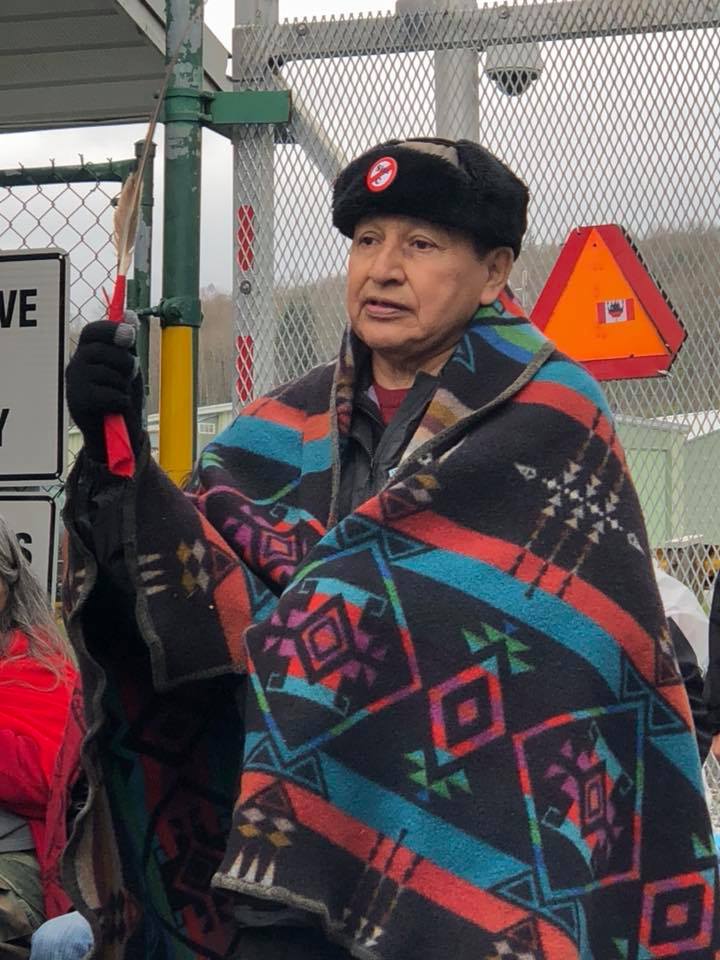Canada News
First Nations, environment groups say latest energy board pipeline review flawed

“I find it absolutely amazing that the prime minister is without conscience, without any sense of responsibility to the citizens of this country and future generations,” he said at a news conference Tuesday. (File Photo: UBCIC/Facebook)
VANCOUVER — The National Energy Board is repeating its mistakes with a new review of the Trans Mountain pipeline expansion, laying the groundwork for another court challenge, say First Nations, environmental advocates and politicians in British Columbia.
The new review of the project’s impacts on the marine environment is too rushed and limited and the federal government must urgently step in to expand the scope, said Union of B.C. Indian Chiefs Grand Chief Stewart Phillip.
“I find it absolutely amazing that the prime minister is without conscience, without any sense of responsibility to the citizens of this country and future generations,” he said at a news conference Tuesday.
The Federal Court of Appeal quashed the government’s approval of the project in August, citing the energy board’s failure to examine impacts on the ocean ecosystem, including B.C.’s endangered southern resident killer whales. It also found Canada failed to meaningfully consult with First Nations during the final phase of discussions.
Prime Minister Justin Trudeau’s government, which purchased the pipeline and expansion project for $4.5 billion, ordered the energy board to review the project’s marine shipping effects within 155 days and issue a report no later than Feb. 22.
The board limited the review’s geographic scope to 12 nautical miles off the B.C. coast. But whales inhabit waters well beyond that area, so the scope should be 200 nautical miles, said Eugene Kung, a lawyer with West Coast Environmental Law.
“They’re continuing to ignore key issues like climate, like project economics and instead importing wholesale the stale evidence from the last time around,” he said.
The court ruling in August followed a lengthy legal battle waged by First Nations, environmental groups and Metro Vancouver cities. On Tuesday, several of the same parties said the new process appeared headed toward another court challenge.
Kung said any challenges would likely be filed after the energy board publishes its report in February, as any legal cases filed now could be tossed out for being filed too soon.
Phillip said he’s firmly opposed to the project and there is no review process that could satisfy him.
“This project has always been a real stinker from the very beginning,” he said, adding that climate change has contributed to worse wildfires and flooding that disproportionately affect First Nations.
Vancouver’s new mayor, Kennedy Stewart, was scheduled to appear at the news conference but organizers said his busy schedule prevented him from showing up. Stewart, a former New Democrat MP, was arrested protesting the project earlier this year.
“I just want to remind the prime minister that people who opposed this pipeline are being elected,” said Jean Swanson, a newly elected Vancouver councillor.
Green Leader Elizabeth May, who was arrested alongside Stewart, noted a recent United Nations report found a temperature increase of only 1.5 C will have catastrophic impacts.
“We have a very troublesome (energy board) process with the same flawed mindset, but in a new context, a context in which we can no longer pretend that you can … dig a hole and get out of it at the same time,” she said.
She described the energy board as “manifestly incompetent” to do environmental assessments.
Energy board spokesman James Stevenson said the board has been conducting such assessments since the mid-1990s and has experienced, expert technical staff.
The board sought comments on whether the review should extend to Canada’s territorial sea limit of 12 nautical miles or to Canada’s exclusive economic zone of 200 nautical miles, and it decided in favour of the former “on a principled basis,” he said.
The focus of the review is to apply the Canadian Environmental Assessment Act and the Species at Risk Act to project-related marine shipping, he said, adding the board is confident it can complete a thorough review within 155 days.
Natural Resources Minister Amarjeet Sohi has met and spoken with First Nations and Metis leaders and will continue to engage with Indigenous communities, said press secretary Vanessa Adams.
“The Federal Court of Appeal was clear that our government needed to do a better job consulting Indigenous peoples and to take into account the impact of marine shipping, and that is exactly what we are doing,” she said.





















